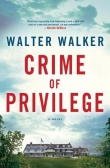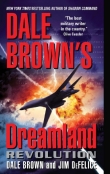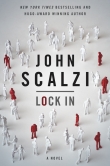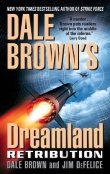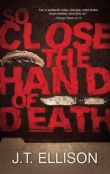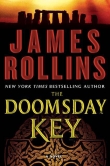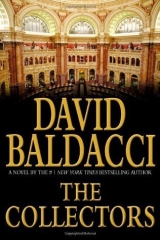
Текст книги "The Collectors"
Автор книги: David Baldacci
сообщить о нарушении
Текущая страница: 15 (всего у книги 27 страниц)
Chapter 36
Caleb managed to get Stone and Reuben through security on the strength of his credentials and the lie that they were important visitors looking at an exhibit after hours, although Caleb did so reluctantly and thus not very smoothly.
As they took the elevator down to the basement, Caleb complained, “Well, I don’t feel all that different for having committed a felony!”
“Oh, the felony’s coming up, Caleb,” Stone said, showing his friend the ring of special keys. “What you did back there was probably no more than a misdemeanor.” Caleb merely glared at him.
They located the room, which had large double doors. Stone quickly found the key on his ring that would fit the lock. A moment later they were inside the spacious room. The fire suppression equipment was against one wall.
“Now I see the reason for the large doors,” Stone said.
The cylinders were huge, each probably weighing nearly a ton, and would not have fit through a regular–size door. Several of them were connected to pipes that ran to the ceiling and beyond.
The labels on the cylinders all read ‘Halon 1301.’ “Fire Control, Inc.,” Stone said, reading the name of the company that had installed the equipment, which was also printed on the cylinders. He next studied the piping configuration. “There’s a manual switch here to turn on the gas. And the pipes must run to a number of rooms in addition to the book vaults. But it’s not clear which cylinder would be running to your space, Caleb.”
Reuben looked over Stone’s shoulders. “And you can’t really tell if they’ve been discharged or not.”
Stone moved to the HVAC ductwork and pulled out the drawing Milton had done. He glanced at a section of ductwork that rose straight to the ceiling.
“Why are you so interested in the HVAC, Oliver?” Reuben asked.
“If some sort of gas was used to kill Jonathan, then the killer would have to know that he’d be at an exact spot before knowing when to turn on the gas line from down here.”
Caleb said, “That’s right, I hadn’t thought about that. Since there was no fire to trigger the gas, it had to have been turned on manually. But to do that, you’d have to be in this room. So how could the killer know that Jonathan would even be in that part of the vault?”
“I think he knew Jonathan’s daily pattern. He was always the first one in the vault, and he regularly visited certain areas while he was inside, including the place where he died.”
Reuben shook his head. “Okay, but from what Caleb told us he found DeHaven’s body about twenty feet from one of the nozzles, meaning he was in the perfect place to be killed by the gas. But how would the person have known that all the way down here?”
Stone looked at Milton’s drawing and then pointed to the HVAC. “This trunk line feeds directly into the book vault, running through all levels of it.”
“So?”
Stone was looking around the HVAC and then stopped. On the side not visible from the main area, Stone pointed at something. Reuben and Caleb looked at the spot.
“Why would you have an access panel cut into the ductwork?” Reuben wanted to know.
Stone opened the small panel and looked inside. “Caleb, remember the vent in the ductwork near where Jonathan’s body was found. The grille was bent?”
“Yes, I remember you pointing that out. What about it?”
“If someone placed a camera attached to a long cable inside the ductwork in the book vault and bent the grille open, the camera would have a clean shot of the vault area where Jonathan was that morning. And if someone was down here with a receiver attached by that cable to the camera, I believe he could see everything going on up there, including Jonathan’s movements.”
“Damn,” Reuben said. “And they used the ductwork —”
“Because that was the only way to run the cable. A wireless signal might not go through all the concrete and other obstructions,” Stone said. “I think if we examine the ductwork inside the vault behind that bent grille, we’ll note some evidence of how the camera was hung. The person waits down here, sees Jonathan on the camera and hits the manual switch, having disconnected the warning horn beforehand, and in ten seconds the gas is fully dispersed and Jonathan dies.”
“But whoever did it would certainly have gone to retrieve the camera, so why didn’t he bend the grille back then?” Reuben asked.
“He might have tried, but once you start bending those grilles, it’s hard to get them back perfectly.” He looked at Caleb. “Are you all right?”
Caleb was ashen–faced. “If what you’re saying is true, then someone working at the library killed Jonathan. No one else could’ve entered the book vault unaccompanied.”
“What the hell’s that?” Reuben hissed.
Alarmed, Stone looked at the door. “Someone’s coming. Quick, behind here.”
They scrambled behind the HVAC system, Reuben having to half carry the terrified Caleb. They had barely gotten out of sight before the double doors opened. Four men came in, all wearing blue jumpsuits. Right behind them a forklift sailed into the room, driven by a fifth man. Another, obviously the boss, held a clipboard as the others gathered around him.
“Okay, we’re taking this one, this one and that one,” he said, pointing at three cylinders, including two attached to the piping. “And replacing them with the three on the forklift,” he added.
The men went to work carefully unhooking the enormous pressurized cylinders from the pipes while Stone and the others watched from their hiding place.
Reuben glanced at Stone, who shook his head and put a finger to his lips. Caleb was shaking so badly that Stone grabbed one of his arms and Reuben the other to try and steady him.
A half hour later the three cylinders were lifted up by the forklift and strapped on. Next the three cylinders the men had brought in were attached to the piping system. Then the forklift moved out of the room, with the other men trailing. As soon as the doors closed behind the men, Stone went over to the newly installed cylinders and read the labels. “FM–200. Caleb, you said the library was scrapping the halon system. They must be replacing it with this type of fire suppressant.”
“I suppose,” Caleb replied.
“Okay, we’ve got to follow them,” Stone said.
Caleb whimpered, “Please, Oliver, no.”
“Caleb, we have to.”
“I … don’t … want to die!”
Stone shook him hard. “Get ahold of yourself, Caleb. Right now!”
Caleb looked at Stone in stunned amazement and then sputtered, “I don’t appreciate you assaulting me.”
Stone ignored this. “Which way is the loading dock?”
Caleb told him, and as they were heading out, Stone’s cell phone buzzed. It was Milton. Stone told him what had happened. “We’re going to follow the cylinders,” he said. “We’ll keep you posted.”
• • •
Milton clicked off the phone and looked up at Annabelle. They were in her hotel room. He relayed what Stone had told him.
“That could be dangerous,” she said. “They don’t really know what they’re getting into.”
“But what can we do?”
“We’re their backup, remember?”
She ran to the closet, pulled out a bag and slipped a small box out of it.
Milton immediately looked embarrassed because it was a tampon box.
She noted his discomfort. “Don’t get all shy on me, Milton. Women always hide things they don’t want found in their tampon box.” She opened the box, took something out and slipped it in her pocket. “They said the name of the company was Fire Control. I’m assuming they’re going to the company’s storage facility. Can you find it?”
“Your hotel has WiFi, so I can look it up on the Net,” Milton said, his fingers already flying over the keyboard.
“Good. Is there a novelty store around here somewhere?” she added.
He thought for a moment. “Yeah. It’s got like magic stuff too. And it’s open late.”
“Perfect.”
Chapter 37
The Nova followed the Fire Control, Inc., truck at a discreet distance. Caleb was driving, Stone next to him and Reuben in the rear.
“Why don’t we just call the police and let them handle it?” Caleb complained.
“And tell them what?” Stone said. “You said the library is having the old system scrapped. For all we know, that’s all those men are doing. And it might alert the wrong people that we’re on to something. We need stealth here, not the cops.”
Caleb snapped, “Terrific! So I have to go in harm’s way instead of the police? What the hell I pay taxes for I’m sure I don’t know.”
The truck turned left and then hung a right. They had passed through the Capitol Hill area and entered a run–down part of town.
“Slow down,” Stone said. “The truck’s stopping.”
Caleb eased the car to the curb. The truck had halted at a chain–link gate that another man inside the complex was now opening.
“It’s the storage facility,” Stone said.
The truck pulled through, and the gate was locked behind it.
“Well, that’s all we can do here,” Caleb said in a relieved tone. “My God, do I need a decaf cappuccino after this nightmare of an evening.”
Stone said, “We need to get inside the fence.”
“Right,” Reuben agreed.
“Are you both insane!” Caleb cried out.
“You can wait in the car, Caleb,” Stone said. “But I have to check out what’s going on in there.”
“But if you get caught?”
“Then we get caught. I think it’s worth it,” Stone replied.
“And I can stay in the car?” Caleb said slowly. “But that doesn’t seem fair if you two are risking —”
Stone cut him off. “If we need to get away quickly, it’s better to have you in the car, ready to roll.”
“Absolutely, Caleb,” Reuben agreed.
“Well, if you say so.” Caleb tightened his grip on the wheel and got a determined look. “I have been known to lay down rubber on occasion.”
Stone and Reuben slipped out of the car and made their way toward the fence. Hiding behind a stack of old boards outside the storage complex, they watched as the truck parked in a corner of the lot. The men climbed off the truck and walked into the main building. A few minutes later the men, wearing their street clothes, drove off in their own cars. A security guard locked the gate behind them and went back into the main building.
“Our best bet is probably to scale the fence on the other side where the truck’s parked,” Reuben said. “That way the truck is between us and the building in case the guard comes back out.”
“Good plan,” Stone said.
They hustled around to the other side of the fence. Before they started climbing, Stone tossed a stick at the fence. “Wanted to make sure it wasn’t electrified.”
“Right.”
They slowly scaled the fence and quietly dropped down on the other side, squatted low and started making their way toward the truck. Halfway there, Stone stopped and motioned for Reuben to drop to his belly. They scanned the area but saw no one. They waited another minute and started moving again. Stone suddenly veered away from the truck toward a small concrete–block building near the rear of the fence. Reuben hurried after him.
The door had a lock, but one of Stone’s keys fit it.
Inside, the place was filled with large cylinders. Stone took out a small flashlight he’d brought with him and shone it around. There was a workbench littered with tools, and a small paint machine in one corner next to some cans of paints and solvent. Hanging on one wall was a portable oxygen tank and mask. Stone flicked his light on some of the cylinders and read off, “FM–200. INERGEN. Halon 1301, CO2, FE–25.” He stopped and came back to the CO2 cylinder, studying the markings closely.
Reuben nudged him. “Look,” he said, pointing at a sign on the wall.
“Fire Control, Inc. We know that,” Stone said impatiently.
“Read the name below that.”
Stone sucked in a breath. “Fire Control is a subsidiary of Paradigm, Technologies, Inc.”
“Cornelius Behan’s company,” Reuben muttered.
• • •
Caleb sat fidgeting in the Nova, his gaze on the fenced area. “Come on,” he said. “What’s taking so long?”
He suddenly plopped down sideways in his seat. A car passed by him on its way to the storage facility. After it had gone past, he sat back up and his heart nearly skipped a beat. It was a private security cruiser; in the backseat was a large German shepherd.
Caleb pulled out his cell phone to call Stone, but the battery was dead. He was forever forgetting to charge the damn thing because he didn’t like talking on it in the first place.
“Dear God!” Caleb groaned. He took a deep breath. “You can do this, Caleb Shaw. You can do this.” He let out a deep breath, focused and then quoted dramatically from one of his favorite poems to pluck up his courage. “Half a league, half a league, / Half a league onward, / All in the valley of Death / Rode the six hundred. / ‘Forward, the Light Brigade! / Charge for the guns!’ he said: / Into the valley of Death / Rode the six hundred.” He paused and looked up ahead where the real–life drama was unfolding with attack dogs and armed men, and his backbone began to bend ominously. The rest of his courage faded as he reflected on the fact that the damn Light Brigade had been wiped out.
He snapped, “Tennyson didn’t know shit about real danger!”
Caleb climbed out of the car and made his way hesitantly toward the fence.
• • •
Back outside, Stone and Reuben headed toward the truck.
Stone said, “Keep a lookout while I check.” He scampered up in the bed of the truck; it had an open back, with wooden slats all around to keep the cargo in. He used his light to see the painted labels on the cylinders. All but one read “Halon 1301.” The other’s label read “FM–200.” Stone pulled from his jacket pocket a small can of turpentine and a rag that he’d taken from the storage building, and started applying turpentine over the cylinder with the label FM–200.
“Come on, come on,” Reuben said, his gaze darting in all directions.
As the coat of paint started to dissolve, Stone stopped rubbing and shone his light on the label that had been painted over. He rubbed some more until it was finally revealed. “CO2,” he read. “Five thousand ppm.”
“Oh, hell!” Reuben hissed. “Run for it, Oliver.”
Stone looked over the side of the truck. The canine was just stepping out of the security cruiser near the front gate.
Stone jumped down, and keeping the truck between them and the cruiser, they hustled toward the fence. However, the truck could not hide their scent from the dog. Stone and Reuben heard it howl, and then they could hear the four legs headed their way, followed by the two guards.
Stone and Reuben sprang onto the fence and started climbing. The dog reached them and sank its teeth into Reuben’s pant leg.
Outside the gate, Caleb watched helplessly from a hiding place, uncertain of what to do but trying to screw up his courage to attempt some action.
“Hold it right there,” a voice called out. Reuben was trying to kick his leg free, but the dog was holding on tight. Stone looked down and saw the two guards, their guns pointed at them.
“Come down from there, or the dog’ll take your leg off,” a guard snapped. “Now!”
Stone and Reuben slowly climbed down. The same guard called off the dog. It retreated a bit, its teeth still bared.
“I think this is all a simple misunderstanding,” Stone began.
“Right, tell it to the cops,” the other guard snarled.
“We’ll take over from here, boys,” a woman’s voice called out.
They all looked over. Standing outside the gate beside her black sedan was Annabelle. Milton stood next to her, wearing a blue windbreaker and a ball cap with “FBI” stenciled on it.
“Who the hell are you?” one of the guards said.
“FBI Agents McCallister and Dupree.” She held up her creds and opened her jacket so they could see her badge and also the gun on her belt holster. “Open the gate and keep the damn doggie off us,” she snapped.
“What the hell is the FBI doing around here?” the same guard said nervously as he ran over to the gate and unlocked it.
Annabelle and Milton stepped through. She said to Milton, “Read ‘em their rights and cuff ‘em.” Milton took out two pairs of handcuffs and headed over to Stone and Reuben.
“Wait a minute,” the other guard said. “We catch anybody trespassing, our orders are to call the police.”
Annabelle got in the plump young man’s face, looking him up and down. “How long have you been in, uh, security, kid?”
“Thirteen months. I’m weapons–certified,” he said defiantly.
“Sure you are. But put your damn gun away before you accidentally shoot somebody, like me.” He reluctantly holstered his weapon as Annabelle held up her creds again. “This trumps the local cops every time, okay?” The realistic–looking credentials, which were part of a packet she’d had Freddy make for her just in case, were what Annabelle kept in her tampon box.
The guard swallowed nervously. “But we got procedures.” He pointed at Stone and Reuben, whom Milton was handcuffing. On the back of Milton’s windbreaker was also stenciled “FBI.” They’d gotten that at the novelty shop along with their fake guns, badges and handcuffs. “And they were trespassing.”
Annabelle laughed. “Trespassing!” She put her hands on her hips. “Do you even know who you’ve got here? Do you?”
The guards glanced at each other. “Two old bums?” one of them answered.
“Hey, you little son of a bitch,” a handcuffed Reuben roared in mock fury, and jumped forward. Milton instantly drew his pistol and placed it against the side of Reuben’s head, shouting, “Shut the hell up, lard–ass, before I blow your damn head off.”
Reuben immediately froze.
Annabelle said, “The big ‘pleasant’ guy over there is Randall Weathers, wanted on four counts of drug dealing, money laundering, two charges of murder in the first and the bombing of a federal judge’s home in Georgia. The other guy is Paul Mason, aka Peter Dawson, among sixteen other phony names. This asshole’s got a direct line to a Middle East terrorist cell operating in the shadow of the Capitol. We’ve been running a wiretap on his cell phone and e–mail. We picked up his trail tonight and followed it right here. Looks like they were doing a recon to steal some explosive gas. We think they were targeting the Supreme Court this time. Park a truck of that stuff in front with a timer and watch all nine justices get blown right to hell.” She looked over at Stone and Reuben in disgust. “You guys are going down all the way this time. All the way,” she added ominously.
“Damn, Earl,” one of the guards said excitedly to his partner. “Terrorists!”
Annabelle took out a notebook. “Let me get your names. The Bureau will want to know who to give commendations to for helping with the bust.” She smiled. “And I think I see big raises in both your futures.”
The two guards looked at each other, grinning. “Hot damn,” the one named Earl exclaimed. They gave her their names and then she turned to Milton. “Get ‘em in the cruiser, Dupree. The sooner these slimeballs are at WFO, the better.” She turned back to the guards. “We’ll bring the locals in, but only after we’ve done a little ‘interrogation’ of these boys, FBI–style.” She winked at the guards. “But you didn’t hear that from me.”
They both grinned knowingly at her. “Kick the crap out of ‘em both,” Earl said.
She said, “Roger that. We’ll be in touch.”
They put Stone and Reuben in the backseat of the sedan and drove off.
Caleb waited until the guards were out of sight, then raced back to the Nova and followed Annabelle’s car.
Inside the sedan, Milton took the handcuffs off Stone and Reuben.
“Milton, you were talking some serious trash back there,” Reuben said proudly.
Milton beamed. He took his ball cap off, and his long hair streamed down.
Stone said to Annabelle, “When you do backup, you really do backup. Thanks.”
“In for a dime, in for a dollar,” she said. “Where to now?”
“My place,” Stone answered. “We have a lot to talk about.”
Chapter 38
Roger Seagraves drove his rental car slowly through the quiet streets of the affluent D.C. neighborhood, turning left onto Good Fellow Street. At this hour most of the large homes were dark. As he passed the late Jonathan DeHaven’s house, he seemed not to even glance over. Another thunderstorm had come his way. He was getting a little tired of the weather pattern. But it really was the perfect setup; he couldn’t let it pass. He kept driving slowly, as though he were just on a leisurely tour admiring the old mansions. Next he drove around the block and made his way down the parallel street, carefully noting the lay of the land.
Observing it and coming up with a plan, however, were two very different things. He needed time to think. One observation had caught his eye: the house across the street from Behan’s. A person with a pair of binoculars was in there watching. Watching what? Regardless, he would have to take that into account when preparing his attack. And when eyes were watching, there was only one way to kill and then get away.
After he had finished his reconnoiter, Seagraves parked his rental car at a hotel. Gripping a briefcase, he walked into the bar, had a drink and then took the elevator up as though going to his room. He waited an hour and then took the stairs down. Exiting the building through another door, Seagraves slid into another car he had waiting in an adjacent parking lot. He had something else to do tonight besides contemplating another murder.
He drove to a motel, drawing a key out of his pocket as he exited his car. With ten quick strides he was at the door of a room on the second level overlooking the parking lot. He opened the door but did not turn on the light. He walked quickly to the door connecting to the next room, unlocked it and went through. As he stepped into the second room, Seagraves could sense the other person’s presence but said nothing. He took off his clothes and climbed into bed with her. She was soft, curvy, warm and, most important of all for his purposes, a shift supervisor at NSA.
An hour later, each of them satisfied, he dressed and smoked a cigarette while she showered. He knew that she had taken the same steps he had to avoid being followed, and the NSA had so many employees it simply couldn’t keep track of them all. And she’d never given anyone any reason to show interest in her, which was why he’d recruited her for his operation. And they were both single, so even if the rendezvous were discovered, it would be put down to simple sex between two consenting adults who happened to be federal employees, which, as yet, was not illegal in America.
The water in the shower stopped. He knocked on the bathroom door and opened it. He helped her out of the shower, gave her naked ass a squeeze and dropped another kiss on her.
“I love you,” she said, nuzzling his ear.
“You mean you love the money,” he answered back.
“That too,” she cooed, dropping her hand to his crotch and pressing against him.
“One a night,” he said. “I’m not eighteen anymore.”
She gripped his muscular shoulders. “Could’ve fooled me, baby.”
“Next time,” he said, slapping her butt hard and leaving a red mark.
“Be rough again,” she said, breathing in his ear. “Make me hurt.”
“I don’t know any other way.”
She pushed him against the wall, her damp breasts wetting his shirt, and ripped at his hair as she tried to stick her tongue all the way down his throat. “God, you are so damn sexy,” she moaned.
“That’s what they tell me.”
He tried to pull away but she wouldn’t let go. “The money wire goes out on schedule?” she asked in between jabs of her tongue.
“As soon as I get my cash, you get yours, sweetie.” And she cooed again, and this time let him free after he’d given her butt another hard slap, leaving a mark on the other cheek.
Yes, stupid, it really was all about the money.
While she finished in the bathroom, he walked back into the other room, flicked on a light, grabbed her purse off the nightstand and slid the digital camera out of one of the inner pockets. He thumbed the twenty–gig hard drive out of the slot and used his fingernail to scrape off a small black veneer from the back of the inch–long drive. He stared at the miniature object for a few seconds. Tiny in size, it represented at least $10 million, maybe more, to an eager buyer in the Middle East who did not like America knowing his plans of death and destruction for those who opposed him.
The information on this black gem would balance out the fight, at least for a little while, until NSA figured out that their new surveillance program had been compromised. Then they’d change it, Seagraves would get another call and he, in turn, would make a call. Then a few days later he’d go to another motel, screw the lady again, peel off another veneer and make another eight figures. Repeat business was his staple. They’d continue to do it until NSA started to realize that the mole was somewhere close. Then Seagraves would shut the operation down at NSA, for a while anyway, since bureaucrats tended to have short memories. In the meantime he’d just go after another target. And there were so many.
He used a bit of gum to stick the piece of veneer containing digital details of NSA’s surveillance program behind one of his front teeth. Then he went to the first motel room he’d entered, where another change of clothes hung in the closet. He showered, changed and left, walking along the street for a few blocks, then grabbed a bus, rode it to a rental car shop, slid into another leased ride and drove home.
He spent an hour digging the information out of the tiny device and another hour putting it in proper form for passing on. As a spy Seagraves had long been an enthusiastic student of secret codes and the history of cryptology in general. Nowadays computers encrypted and decrypted messages automatically. The most secure systems used keys consisting of hundreds or even thousands of digits – far longer than the actual messages being encrypted. At the very least, breaking the strongest of these keys required enormous computing power and thousands if not millions of years. This was so because modern–day cryptologists assumed that the coded messages would be intercepted and thus had engineered their encryption systems for that eventuality. Their mantra could be: You can intercept it, but you almost certainly can’t read it.
Seagraves had opted for a more vintage method of encryption, one that, because of the way the messages were communicated, might be even more unbreakable than the modern–day, computer–generated juggernauts for one simple reason: If you couldn’t intercept the message, you had zero chance of reading it. There was something to be said, he mused, for the old ways. Even the NSA, with all its technological might, could learn a lesson from that.
After he had finished that task, he fell into bed.
Instead of sleeping, though, all he could think about was his next kill. That would enhance his precious “collection” by one.
• • •
Back at his cottage, Stone quickly brought the others up to date on what they’d found. When he’d mentioned the hidden lettering on the cylinder reading “CO2, 5,000 ppm,” Milton had immediately gotten on his laptop where he’d stored pertinent downloaded files from the Internet. After Stone had finished speaking, Milton said, “CO2 is almost never used in occupied spaces because it can suffocate people as it instantly takes oxygen content out of the air to extinguish fires. At five thousand parts per million it would be rapidly fatal for someone standing nearby; he’d be overcome before he could escape. And it’s not a pleasant way to die.”
Annabelle made a coughing noise, stood and went over to look out the window.
“And I presume it has a cooling effect,” Stone said hastily, eyeing her with concern.
Milton nodded as he scanned his screen. “With high–pressure systems there’s a discharge of dry ice particles. They call it a snow effect because it rapidly absorbs heat, reduces ambient temp and helps prevent flash and reignition of the fire. The snow turns to vapor under normal temperatures and leaves no residue.”
Stone added, “By the time Caleb and DeHaven were found in the vault, the O2 levels had probably returned to almost normal, and any lingering chill would be put down to the extraordinary levels of cooling in the vaults.”
“But if DeHaven were killed by CO2 suffocation, wouldn’t that have turned up in the autopsy?” Reuben asked.
While they’d been talking, Milton’s hands had been flying over his keyboard. “Not necessarily. This is information I downloaded earlier from a site sponsored by a national medical examiners’ organization. While carbon monoxide poisoning can be detected postmortem by the cherry–red appearance of the skin, carbon dioxide exposure doesn’t leave such clear–cut signs.” Reading from the screen, Milton said, “The only way to detect low levels of oxygen in a person is through a blood gas test which measures the ratio of oxygen to carbon dioxide in a person’s blood. But that test is only done on the living to see if oxygen levels need to be increased. It’s never done postmortem for the simple fact that the person’s dead.”
Caleb added, “From what I was told afterward Jonathan was pronounced dead in the vault. He wasn’t even taken to the emergency room.”
Stone said, “The cylinder they removed with the label FM–200 was the one I focused on, for obvious reasons.”
“I’m not getting what you mean,” Reuben replied.
“The library’s scrapping the halon system. If I’m right and they brought in a cylinder full of deadly CO2 with the wrong label to disguise it, they wouldn’t have been bringing halon back to the library; that would have raised suspicion.”
“Right, they’d have to bring in the gas they were replacing the halon with. FM–200,” Caleb added. “And they took it out tonight with a bunch of halon cylinders. If we hadn’t been there, no one would’ve noticed.”
Stone nodded. “And I’m certain that the cylinder connected to the piping tonight was full of halon. The empty cylinder that had contained the CO2 was probably disconnected from the piping right after it was discharged. Then if the police happened to check, they’d find nothing out of the ordinary. They wouldn’t check every cylinder in the place, certainly. And even if they did check, they’d have to send it to Fire Control, Inc., for that purpose. I doubt they’d get an accurate answer back because whoever orchestrated this is obviously employed by the company.”
